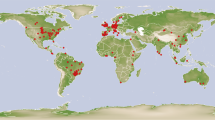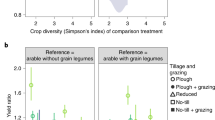Abstract
THE past history of agricultural science furnishes several examples of belated explanations of the utility of practices the value of which has long become a tradition among practical men. The explanation of the value of leguminous crops in agriculture is a good example. While the recognition of the rôle of these crops in increasing the nitrogen supply in the soil has done much to improve agriculture in new countries, it has only served to provide a scientific approval of the cultural practices of ancient civilisations, such as that of India, where from time immemorial it has been the custom to grow leguminous crops in the rotation and also as one of the constituents of the mixed crops cultivated in many parts of the country.
This is a preview of subscription content, access via your institution
Access options
Subscribe to this journal
Receive 51 print issues and online access
$199.00 per year
only $3.90 per issue
Buy this article
- Purchase on Springer Link
- Instant access to full article PDF
Prices may be subject to local taxes which are calculated during checkout
Similar content being viewed by others
Author information
Authors and Affiliations
Rights and permissions
About this article
Cite this article
HOWARD, A., HOWARD, G. The Fertilising Influence of Sunlight. Nature 82, 456–457 (1910). https://doi.org/10.1038/082456b0
Issue Date:
DOI: https://doi.org/10.1038/082456b0
This article is cited by
-
Die Mikrofauna des Bodens, ihr Verh�ltnis zu anderen Mikroorganismen und ihre Rolle bei den mikrobiologischen Vorg�ngen im Boden
Archiv f�r Mikrobiologie (1934)
Comments
By submitting a comment you agree to abide by our Terms and Community Guidelines. If you find something abusive or that does not comply with our terms or guidelines please flag it as inappropriate.



